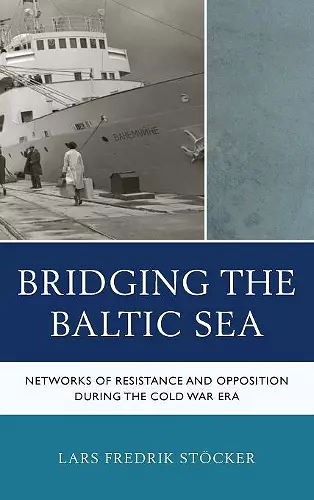Bridging the Baltic Sea
Networks of Resistance and Opposition during the Cold War Era
Format:Hardback
Publisher:Bloomsbury Publishing PLC
Published:20th Dec '17
Currently unavailable, and unfortunately no date known when it will be back

Tracing the origins, evolution, and goals of Polish and Estonian émigré politics in Cold War Sweden and its linkages with both the host and homeland societies, this book investigates the transnational dimension of resistance and opposition to the communist regimes in Central and Eastern Europe. The analysis of the constantly shifting, at times conspiratorial, and even subversive networks that transcended the Iron Curtain draws a line from World War II to the collapse of the Soviet Union, framing half a century of transnationally concerted political activism in a geographical context that has not received much scholarly attention. Challenging the image of the Baltic Sea Region as a periphery of the European Cold War theater, the topography of the multilayered and complex linkages between neutral Sweden and her opposite coasts suggests that the small inland sea was a particularly vibrant setting for processes that efficiently defied the rigid border regimes of the Cold War era.
This book relates both to ongoing historiographical debates about the scope and extent of East-West contacts that developed underneath the radar of international diplomacy and to the question of the role, significance, and impact of émigré politics during the Cold War. Embedding the dynamics of transnationally framed opposition in the wider context of political, economic, and cultural relations at the northeastern peripheries of divided Europe, the study not only sheds new light on so far still unexplored facets of interaction and cooperation between societies in East and West, but also offers a first comprehensive synthesis of the Baltic Sea Region’s post-war history.
This is a brilliant synthesis of the history of half a century of transnational resistance and opposition networks in the Baltic Sea region . . . This monograph is well written, highly readable, and follows a convincing line of argumentation. The author is careful with terminology and his study is indeed a pioneering work. He uses the relevant historiography in English, Estonian, German, Polish, and Swedish, as well as archives in Estonia, Hungary, Poland, and Sweden. In addition, the contemporary press and fifteen interviews are employed to offer a broader perspective. * Slavic Review *
This is an important and well-researched contribution to the growing body of Cold War literature which focuses on transnational cross-border contacts, interactions, and cooperation between East and West in Europe, rather than only on confrontation and division. Lars Fredrik Stöcker demonstrates convincingly how activist networks of Baltic and Polish emigrés benefited from the comparatively low-tension atmosphere of Nordic neutrality in the Baltic Sea region in their intricate and creative work on both sides of the East–West Bloc divide to perforate the Iron Curtain and promote political change. -- Poul Villaume, University of Copenhagen
Lars Fredrik Stöcker has produced a novel and engaging study of the Polish and Estonian émigré communities in Sweden and their struggle to reestablish Poland and Estonia as nation-states during the Cold War. Using an impressive body of sources, Stöcker reconstructs a complex political landscape of the Baltic Sea region, official and clandestine channels of communication across the Iron Curtain, and the challenges that nationalist activists created for socialist regimes. Scholars of post-World War II Europe will greatly benefit from his focus on these ‘rank-and-file’ warriors of the Cold War, as it shows how much East–West tensions were fueled from below. Bridging the Baltic Sea is an academically rigorous volume, but it is also a fascinating read, telling us in a historically accurate manner about double agents, secret operations, intelligence and counter-intelligence activities, and public opinion formation both in the Eastern bloc and in neutral Sweden. -- Alexey Golubev, University of Houston
Transnational networking in the Baltic Sea region contributed to the demise of communism in Poland and the Soviet Union and to the end of the Cold War. In this brilliant study, Lars Fredrik Stöcker demonstrates how, in the Baltic Sea region, the concerted actions of numerous individuals on both sides of the Iron Curtain became the driving force between the major changes that took place in Poland and Estonia in the 1980s. The transnational opposition networks in the Baltic Sea region helped to undermine the repressive Soviet system. Once the Soviet leaders chose to rule by means of perestroika and glasnost instead of repression, an assertive civil society in these two countries managed to blow up the ossified Soviet system from within. In his pathbreaking study, Stöcker shows how the Baltic Sea became a Sea of Peace that melted down the Cold War. -- Kristian Gerner, Lund University
Surveying the Baltic region from World War II to the fall of ‘real socialism’ in 1989, Lars Fredrik Stöcker writes about the wise and the unwise ideas of political émigrés, about realists and dreamers, about the ways of illegal border crossing and secret police, and eventually about the equally illegal transfer of forbidden thoughts, which contributed so much to the ‘annus mirabilis’ of 1989. Stöcker writes accessibly, in a way that will also appeal to general readers, and provides professional historians an eye-opening account of an almost unknown front line of the Cold War. -- Wlodzimierz Borodziej, Warsaw University
ISBN: 9781498551274
Dimensions: 237mm x 159mm x 29mm
Weight: 676g
380 pages